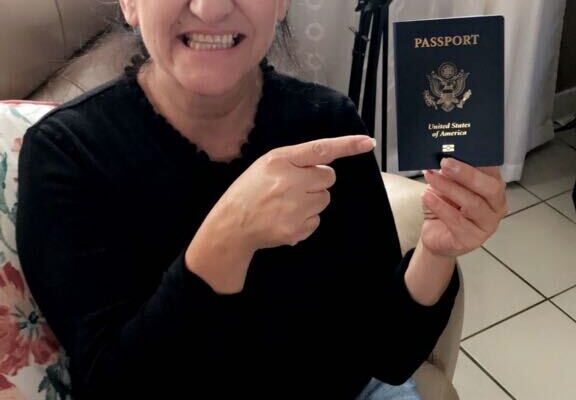It shouldn’t have taken a team of four lawyers and a federal lawsuit for Maria Soto to receive her passport.
But, almost two years after the federal government denied her passport application, and a year after the ACLU of Oregon sued the U.S. Department of State on Maria’s behalf, Maria finally received the document in the mail.
“It was like a dream. I have waited so long for this,” said Maria. “It shows that when you stand up for your rights, you can win.”
Maria is a U.S. citizen who was born in Los Angeles, California. Her case received national and international attention after the Trump administration denied her passport application in 2018. Even though Maria sent the government her original birth certificate from the Los Angeles hospital where she was born, along with a state-issued certified copy of her birth certificate, her social security card, her driver’s license, and other documentation, the government told her the documents she had provided were “not sufficient to establish your identity.”
“I couldn’t believe it. I had given them all the documents I had. It felt like I wasn’t being treated fairly. It felt like discrimination,” Maria said. “It made me afraid that my government didn’t think I was a citizen."
The ACLU of Oregon and cooperating counsel at the law firm Orrick dismissed Maria’s lawsuit after the federal government finally issued Maria’s passport, agreeing that Maria was, in fact, who she said she was.
“We appreciate the opportunity to partner with the ACLU to defend American citizens’ due process and equal protection rights. The challenges that Maria faced are not uncommon, and even though we were able to resolve the matter in Maria’s favor, there are many others that aren’t as lucky,” said Katie Mantoan, an employment litigator in Orrick’s Portland office.
Maria is the daughter of migrant workers from Mexico who were living and working in California when she was born. Though Maria spent her childhood living in Mexico with her grandparents, she always knew that she was a United States citizen. She regularly returned to the United States to visit family, showing her original birth certificate each time she crossed the border. As a young adult, she settled in Southern Oregon, where she has lived with her husband for more than 30 years.
In 2018, Maria and her husband hoped to travel to Peru for vacation, so she applied for her passport like anyone would. In response, the government denied her application, telling her that she had submitted insufficient evidence to prove her U.S. citizenship. Later, the administration made clear that its real issue was that it simply did not believe that Maria was who she said she was—that she was the Maria Soto born in Los Angeles, California, and issued the birth certificate in her possession.
Cases like Maria’s appear to be occurring more frequently. The Trump administration has created a “Denaturalization Task Force” to attempt to strip some naturalized citizens of their citizenship, and the Washington Post reported on a surge of passport denials for Latinx Americans born along the border. President Trump has repeatedly said he is interested in issuing an Executive Order ending birthright citizenship as guaranteed by the 14th Amendment to the United States Constitution. (Spoiler alert: it would be illegal and unconstitutional.)
Across America, Latinx communities are facing unprecedented levels of harassment and discrimination. By insisting on her rights, and by demanding that the U.S. government recognize her citizenship, Maria showed that she is an American citizen, deserving of all the rights that citizenship entails.

